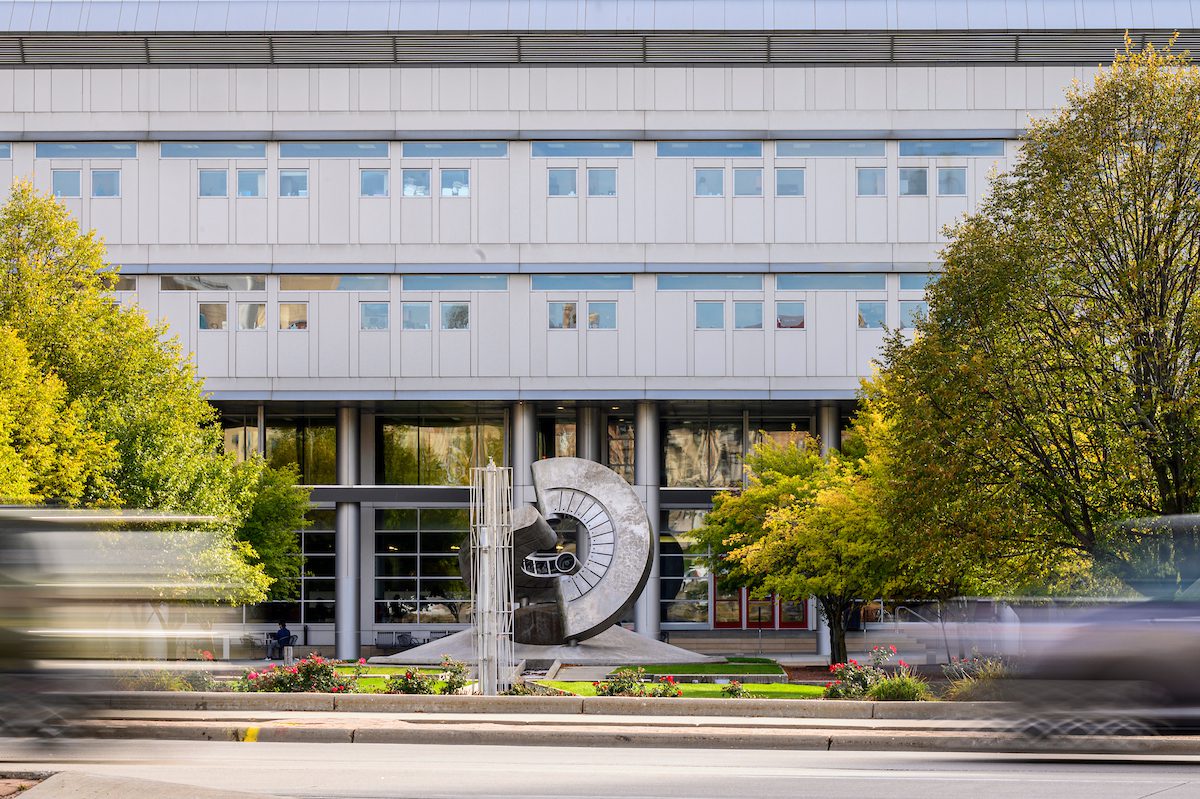Materials Science & Engineering: Materials Engineering
Master of Science in Materials Science and Engineering

Build a comprehensive and applied knowledge base for materials engineering with the UW–Madison accelerated MS in Materials Science and Engineering.
Is this program right for you?
As a student in the UW–Madison accelerated master’s in materials engineering, you can choose from four focus areas. In Nanomaterials and Nanoengineering, you can develop a unique understanding of innovative applications such as nanomaterial synthesis, thin film deposition, polymeric materials, and crystallography. Engineering Materials and Processes offers in-depth knowledge of phase transformation, deformation, corrosion and heat treatment, among others. Semiconductor Materials and Manufacturing for Microelectronics offers an emphasis on the microstructure, fabrication, and properties of electronic, optical, and magnetic materials and semiconductors. Students will be prepared to make an impact in the semiconductor sector as it develops new materials and fabrication methods needed to create future generations of advanced computation, communications, quantum, and sensing devices. Finally, Computation and Artificial Intelligence in Materials Engineering provides the skills to utilize modern computational methods in materials discovery, synthesis, processing, and optimization. This focus area covers deep materials fundamentals combined with quantum simulation, molecular dynamics, and mesoscale methods, as well as integrating materials with the exploding world of machine learning (Generative AI, Transformers, Large Language Models, and more).
Our faculty works together to solve some of the world’s most difficult and challenging problems. UW–Madison’s materials science and engineering faculty have been consistently recognized for their achievements and developments in the materials field.
If you want to continue your education and further your career in the field of materials science and engineering, we can help. With our accelerated master’s degree program and support from expert faculty, you will graduate prepared to enter the field in just one year.
Is this program right for you?
As a student in the UW–Madison accelerated master’s in materials engineering, you can choose from four focus areas. In Nanomaterials and Nanoengineering, you can develop a unique understanding of innovative applications such as nanomaterial synthesis, thin film deposition, polymeric materials, and crystallography. Engineering Materials and Processes offers in-depth knowledge of phase transformation, deformation, corrosion and heat treatment, among others. Semiconductor Materials and Manufacturing for Microelectronics offers an emphasis on the microstructure, fabrication, and properties of electronic, optical, and magnetic materials and semiconductors. Students will be prepared to make an impact in the semiconductor sector as it develops new materials and fabrication methods needed to create future generations of advanced computation, communications, quantum, and sensing devices. Finally, Computation and Artificial Intelligence in Materials Engineering provides the skills to utilize modern computational methods in materials discovery, synthesis, processing, and optimization. This focus area covers deep materials fundamentals combined with quantum simulation, molecular dynamics, and mesoscale methods, as well as integrating materials with the exploding world of machine learning (Generative AI, Transformers, Large Language Models, and more).
Our faculty works together to solve some of the world’s most difficult and challenging problems. UW–Madison’s materials science and engineering faculty have been consistently recognized for their achievements and developments in the materials field.
If you want to continue your education and further your career in the field of materials science and engineering, we can help. With our accelerated master’s degree program and support from expert faculty, you will graduate prepared to enter the field in just one year.
Admissions requirements
All applicants must:
- Have a bachelor of science in the physical sciences or engineering from an accredited institution.
- Have a minimum undergraduate GPA of 3.0.
- Submit evidence of English language proficiency, if applicable. The required proficiency scores are: TOEFL IBT 92, PBT 580; or IELTS 7.0.
Ideal applicants will:
- Have taken mathematics through differential equations, at least one year each of general physics and chemistry, a course in physical chemistry or modern physics, and an elementary course in properties of materials. If not, these courses must be made up as soon as possible after entering the program.
Application materials required:
- Online application
- Resume/CV
- Statement of purpose
- Transcripts
- Two letters of recommendation
Connect with us
Application Assistance: Accelerated Engineering Master's Programs
August 22
9-9:30 a.m.
Join program staff to learn about the College of Engineering Accelerated Master's programs and application best practices. You’ll leave knowing what you need, and how to successfully apply.
Register for Application Assistance: Accelerated Engineering Master's Programs
Program Overview: Engineering: Polymer Engineering
September 18
noon-12:30 p.m.
Get more information about the Engineering: Polymer Engineering MEng program including curriculum, application process and potential career paths.
Register for Program Overview: Engineering: Polymer Engineering
Program highlights
- The materials engineering master’s degree is accelerated, so you graduate in just one year.
- It’s also course-only, so you complete your degree in a predictable time frame.
- With more than $12.8 million in annual research expenditures, nearly 100 patents and 13 startups, our faculty and students are at the forefront of scientific discovery and real-world translation.
- As a UW engineering student, you have access to a community of engineers, so you can network and work alongside faculty and alumni who care about your success.
University of Wisconsin–Madison ranked Best Online Graduate Engineering Programs and Best Engineering Grad Schools by U.S. News & World Report.
How you'll learn
- Twelve months of full-time study on campus to earn your degree.
- Complete the program in one academic year (fall, spring, summer). Courses begin in the fall and summer semesters.
- Students who hold a graduate degree may transfer up to 9 credits of prior graduate work.
- UW–Madison engineering students may count up to 7 credits of coursework numbered 300 or above towards their degree.
Sample curriculum
General Requirements
- Introduction to Materials Science
- Materials Fundamentals
- Thermodynamics of Solids
Focus on Nanomaterials and Nanoengineering
- Nanomaterials and Nanotechnology
- Energy Storage Materials
- Inorganic Organic Hybrid Materials
- Polymeric Materials
- Crystallography and X-Ray Diffraction
- Introduction to Thin-Film Deposition Processes
Focus on Engineering Materials and Processes
- Advanced Materials Science: Phase Transformations
- Fundamentals of Heat Treatment
- Advanced X-ray Scattering Methods in Materials Science and Engineering
- Structural Analysis of Materials
- Mesoscale Modeling of Materials
- Welding Metallurgy
Focus on Semiconductor Materials and Manufacturing for Microelectronics
- Introduction to Thin-Film Deposition Processes
- Properties of Solid Surfaces
- Electronic, Optical, and Magnetic Properties of Materials
- Structure and Properties of Advanced Electronic Materials
- Molecular Modeling of Materials
- Quantum Materials
Focus on Computation and Artificial Intelligence in Materials Engineering
- Data Science in Materials
- Mesoscale Modeling of Materials
- Introduction to Computational Materials Science and Engineering
- Molecular Modeling of Materials
- High Performance Computing for Applications in Engineering
- Structure and Properties of Advanced Electronic Materials
Job outlook
- Engineering Managers
- Project Engineers
- Cost Analysts
- Materials Engineers
- Anthem Blue Cross
- Northrop Grumman
- Apple
- Boeing
- Raytheon Technologies
Source: Lightcast™ 2022
Ready to learn more about Materials Science & Engineering: Materials Engineering?
View the UW-Madison Guide
Stay in touch
Sign up to receive application tips and deadline reminders.
Connect with our enrollment coaches
Our friendly, knowledgeable enrollment coaches are here to answer your questions. Contact an enrollment coach to:
- Learn how to make this program work with your life/schedule
- Get help with your application
- Determine if financial aid is available
Visit with our coaches on campus or at an upcoming student fair in your area. Search student fairs & events.


